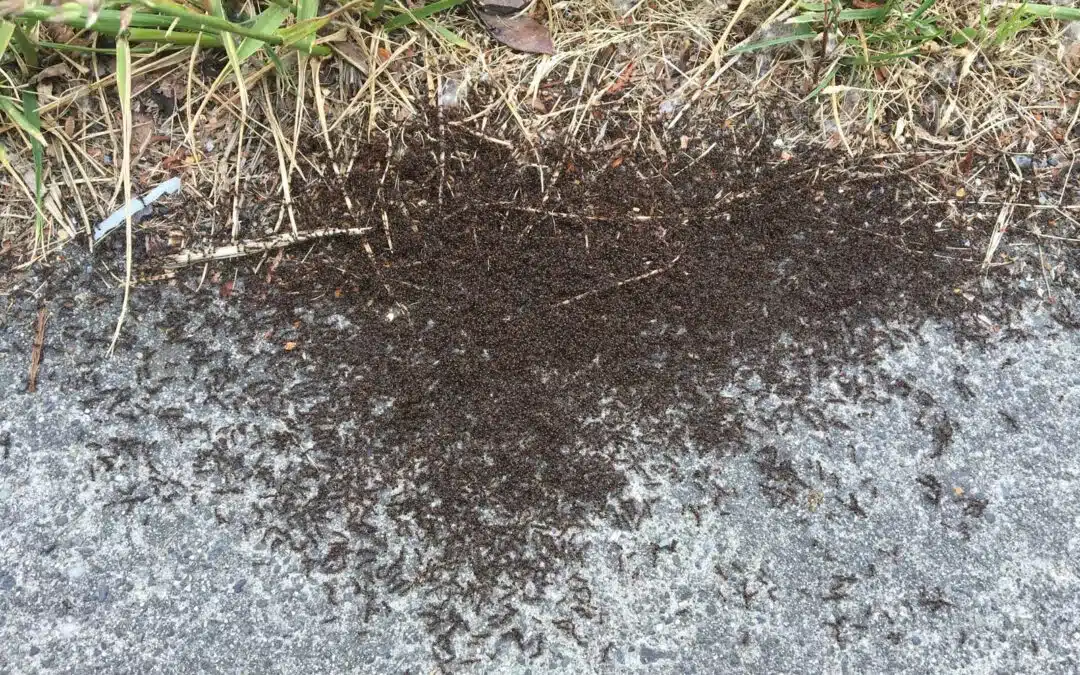Pavement ants are so-called for the simple reason they often build their colonies under pavements, sidewalks, and driveways.
The little cone-shaped piles of soil along the edges of your driveway, lawn, or sidewalk invariably give away their presence. More annoying are the columns of perhaps hundreds of ants scurrying back and forth in your home.
Of the over 140 species of ant in Ohio, Pavement ants (Tetramorium immigrans) are by far the most commonly seen. Arriving from Europe, probably in the 1800s, this invasive species quickly spread across the country to become one of the most common ant species in the US.
What are Pavement ants? Are they dangerous? How can you get rid of them?
What are Pavement Ants?
Pavement ants are small inoffensive-looking bugs, ranging from 1/16 to 1/8 of an inch long. Their color varies from black to brown, while their legs and antennae are paler.
This type of ant can be easily distinguished from other ant species by the ridges or striations on its head and back. They also have two thin spines at the end of their abdomen.
These ants, like many insects, go through a full metamorphosis. Eggs are laid, from which hatch grubs which later pupate. From the pupa emerges an adult ant.
Amazingly, all the eggs are laid by a single queen. That one Pavement ant queen can produce a colony of between 3,000 and 10,000 worker ants.
Typically, in spring or early summer, normally after rains, winged males and winged new queens leave the nest in swarms. These new queens and males mate, after which the queens fly off to establish new colonies.
These small ants are fiercely territorial. In spring and summer, as each colony is expanding its territory, intense fighting involving writhing balls of ants can occur between rival colonies.
Are Pavement Ants Dangerous?
Pavement ants are not classified as a health threat or a danger to property.
They can contaminate food by walking across bacteria-ridden areas and transferring the germs to your food or surfaces but the ants themselves don’t carry disease.
Do Pavement ants bite? No, but they have stings, although these are rarely able to puncture human skin. Despite this, some people are allergic to the toxins.
It is rare for an infestation of this type of ant to cause structural damage to property.
However, with time, a large colony might displace enough soil to cause subsidence to a patio or a similar structure.
What Attracts the Ants?
These ants eat almost anything, from other insects to household waste. The ants’ other name –Sugar ants – comes from their fondness for sweet foods. But they are not fussy. Bread, nuts, meat, and other edibles in your kitchen are ideal food sources.
If a single wandering ant finds a suitable source of food in your house, it will soon lead many others to the food using pheromone trails.
How to Get Rid of Pavement Ants
The main way to stop the ants from coming into the house is to remove anything that attracts them. Keep all kitchen work surfaces and floors clean. Store food in air-tight containers.
Getting rid of Pavement ants involves killing the queen. Ants are trophallactic feeders, which means they pass food from one to another by regurgitation. Pavement ant bait works successfully against such feeders as the poison is ultimately passed from the foraging ants onto the queen. This effectively results in the death of the colony, killing all the Pavement ants.
An Annoying Pest
Despite their size, these ants can be a nuisance, as anyone plagued by an army of ants crossing their kitchen floor will confirm. The good news is that, compared to many pests, they are not normally a risk to health or property.
Ant baits work well but they are not always 100% effective against Pavement ants. If you are overrun with ants, to ensure their complete removal you should call in a pest control professional.
